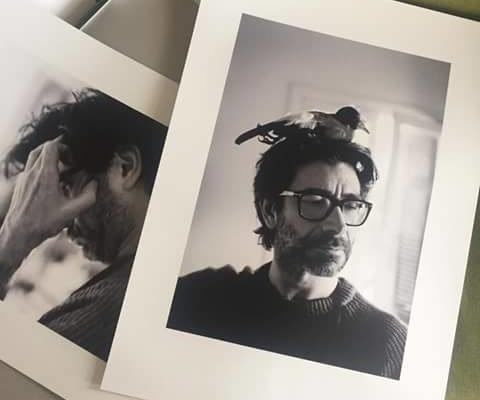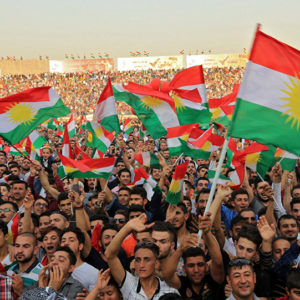The one-legged man artist Semaan Khawam invited our Arts and Culture contributor, Christiane Waked to his studio to talk about what freedom sounds like to a “birdman”.
As I enter his messy studio, the shabby artist welcomes me, cigarette in his mouth, glass of whisky in his hand and I can hear the voice of Leonard Cohen in the background, I take a glimpse at his face, he looks damaged, so I think to myself this interview will completely drain me.
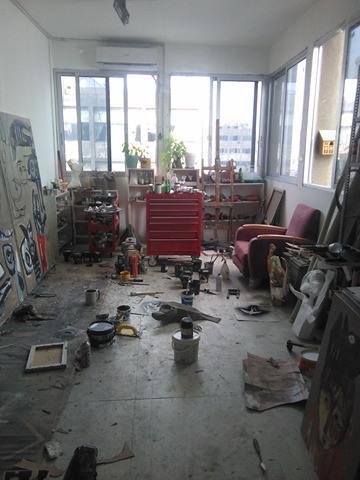
I ask for coffee, he hurries to prepare one and I sit somewhere on the dusty couch making myself very comfortable without asking his permission and our intimate interview goes like this.
C.W: Since when you are in Beirut and how old are you?
S.K: I am in Beirut since 1988 and I am 34. No, I am sorry, I meant 43.
(Me interrupting with a smile, is that a wishful thinking, and he resumes) My family decided to leave Syria for good because we couldn’t tolerate living under the oppressive Baath regime anymore.
I am half Syriac and half Armenian, when I arrived in Lebanon, I suffered because you know how difficult it is to a Syrian to be accepted in here.
To add to my disappointment, I quickly realized that Beirut offers a travesty version of freedom.
While you can enjoy freedom on a personal scale, there is no such thing in the collective sense of the term. It is a sectarian country after all.
C.W: What drove you to paint and who taught you the techniques?
S.K: I have to thank the dictatorship in my country that fueled my pain and drove me to paint. You can say Christiane that “hatred is my muse”.
As for who taught me how to paint, the answer is I am an autodidact. The worst thing you can do to a painter is to teach him how to paint because you will for sure deprive him of a genuine signature.
One thing is for sure that music and literature are the two most important pillars that continue to support my art.
I couldn’t have done it without Cohen, Cave or any of my favorite underground bands.
As a kid in Syria, I was what you call a geek at school but when punk and post-punk music entered my life, I craved for freedom so I left school because I couldn’t support to be brainwashed by the “big brother” anymore.
I broke all the rules and started my own revolution against family, church etc.
C.W: You were granted the Lebanese citizenship in 1994 when the Lebanese government gave opportunities to some Syrians to become Lebanese but tell us about your experience before that date as a Syrian in Lebanon.
S.K: I will tell you what happened one year before I was granted the citizenship. In 1993, the Syrian army launched a draft for all 18 years old Syrians to join the military service.
I panicked because I knew that despite being in Lebanon, at any time I was at risk to be forced to go back to Syria.
In a desperate attempt to run away from this bitter fact and as an opportunity that presented itself, I entered a land mine in Batroun and “boom” I lost my leg but gained my freedom.
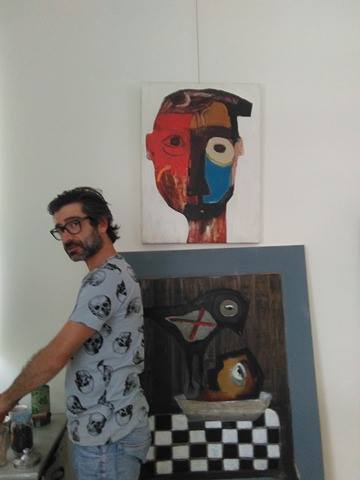
(As he is showing me his wooden leg, I ask for a pause to process about how I am going to proceed with the interview)
C.W: I feel that you are full of rage, hate, and anger, will you ever be able to heal?
S.K: I knew that this hatred could have destroyed me through drugs or alcohol or whatever self-destructive means out there is out there so instead I turned to art.
Quoting Cioran: ” If I detest man, I could not say with the same ease I detest human being, for in spite of everything there is something more, something enigmatic and engaging in that word Being which suggests qualities alien to the idea of man”
C.W: You were called in 2011 to be judged in a civil court because of a graffiti you draw that was considered a threat to civil peace, tell us more about this experience.
S.K: I painted a soldier and in Lebanon, it is forbidden to criticize the army institution or say anything that pushes people to get out of their comfort zone.
After 8 months, I won the case as I was able to defend myself as a citizen who has right for a freedom of speech.
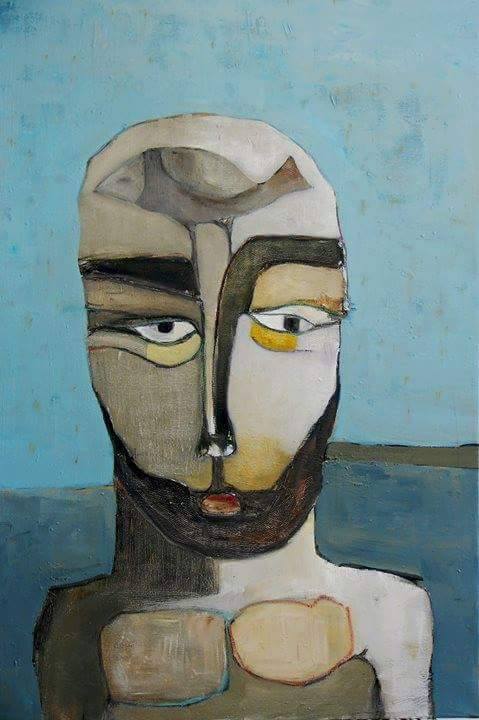
C.W: Are you going to paint the birdman all your life?
S.K: I never felt home, so as long as I am searching for a place where I truly belong, I will keep on painting birdman. This “birdman” is now a symbol for all the refugees who are homesick and on the move.
Now, I have to tell you that I can’t tolerate being in this geographical dimension that takes the shape of Beirut.
I have settled my accounts with this city and I feel like physically my body can’t take it anymore so I need to get myself out of this limbo.
You know Italy gave me an honorary citizenship and in Lebanon, I can’t have the basic rights of a human being such as clean air, uninterrupted electricity etc.
I want to be in a place where there are green gardens where you can feed the birds peacefully.
C.W: Where are you running away to?
S.K: My first stop will be in London from the 4th until 15th October 2017 as a resident artist where I will participate in the exhibition “I can only tell you what my eyes can see” then from there the world is mine.
C.W: Aren’t you attached to the people you are leaving behind?
S.K: Well, sometimes you need to have the guts to kill your family (theoretically speaking) and move on with your life.
In 2001, I left Germany where I had my two major operations after my leg was amputated by the mine and came back to Lebanon to be near my family after my father passed away.
Now I feel the need to put myself first.
C.W: Will you be stuck in being damaged all your life as an excuse to fuel your narcissistic wound through your paintings?
S.K: Healing is a process, each time I paint, I know I am little bit healed.
I am not a victim. I know myself and I know who is my enemy.
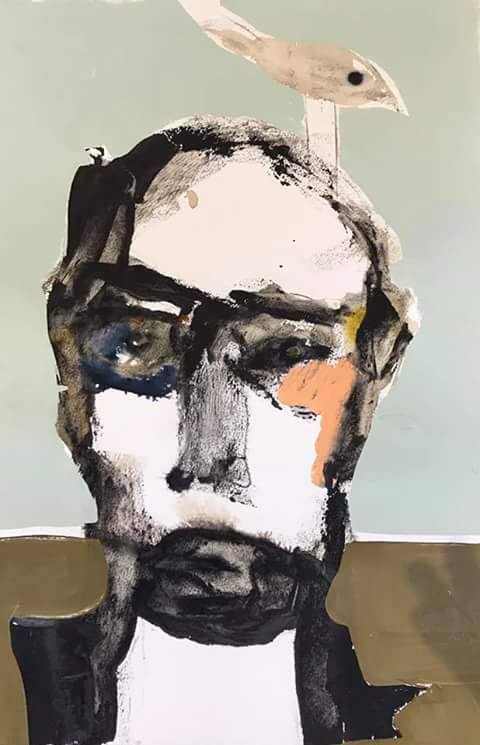
C.W: You are placing yourself as being right and the others wrong. Do you feel entitled to the truth?
S.K: Any dictatorship is wrong. Every time you accept mediocrity, you are wrong. I don’t want to be like the rest of the dull souls living in Beirut.
Listen, I am not a hero but as an artist, I have to speak in the name of all the oppressed. I want to be their voice.
In this part of the world, I don’t have the luxury to do art for the sake of art.
Nevertheless, I can’t expect to be among people who are able to get married and start a family while living in a society that doesn’t provide you with the minimum.
People in Lebanon have become blunt and dull.
C.W: Despite your arguments, this does not give you the right to be judgmental and condescending.
S.K: I am who I am and I am not willing to change. Convince me that I am wrong.
C.W: You have walked on a mine that took away your leg but gave you maybe more depth while others don’t have that privilege.
S.K: You are wrong to think that I owe my depth to a vulgar mine. My question is how can people who lived for more than 20 years through war don’t have a bigger scar than mine.
(C.W: maybe because they are in deep denial and they can’t face this so they use defense Mechanisms.
I believe we need collective consciousness in Beirut to change things. As an artist, I participated in several manifestations but we failed to change things. Then again revolutions are not made with flowers.
C.W: Art is a revolution but don’t you feel that when you are participating in art fairs and giving your works to curators, you are sort of selling your soul?
S.K: It’s up to the others to inflate my work and it’s up to me to humble myself.
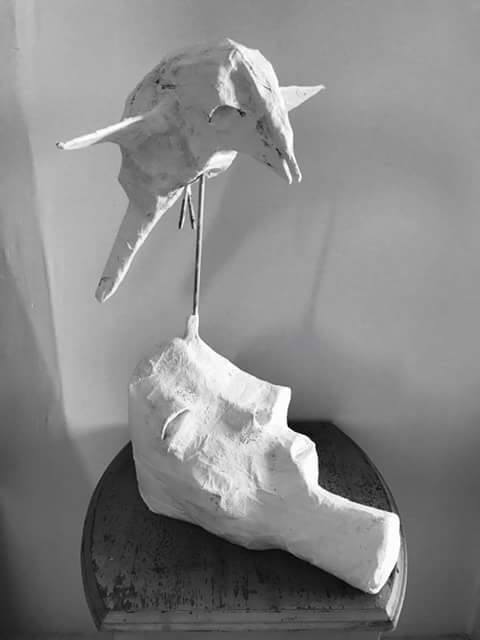
C.W: You are a wonderful painter but I like your sculptures more. What material do you use for your sculptures?
S.K: All my sculptures are made with recycling materials that I used while working in my studio even from my cigarette butts.
C.W: Is art dead? And do you think that artists are rather a burden to society for not being productive?
S.K: Art can never die but there is no more new ideas, no place left for innovation.
As for the second part of your question, I always ask myself if I am a productive person but since I was a child, I wanted to do things that are not violent.
(C.W: you could have been a teacher for example?)
Do you think that a teacher who brainwashes his student is not violent?
(C.W: how can a math’s teacher be violent?)
Whoever said one plus one equals two. It was proved by some lame academics and we all followed. F..K liberals, I would rather face an ISIS member than a liberal.
C.W: Do you still have a happy place you go to in your mind?
S.K: yes, when I was 11 in Syria, my grandfather used to take me to a small piece of land that my family owned where we used to spend hours together watering the plants and talking about life. This is my only happy place.
C.W: Any last words?
S.K: Thank you.
(C.W: well I guess, it is a wrap)
Christiane Waked is a former Press Attaché of the French Embassy to the UAE (2010-2015) also worked as linguist and analyst in the French Interior Ministry (2005-2008)


